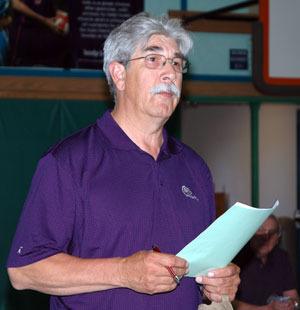MARYSVILLE — When the Puget Sound Clean Air Agency explained its plans to launch a study of the odor that’s been reported by residents of Marysville and Everett over the past four years, it drew sharp criticism from nearly all of the roughly 100 attendees from those same communities who took the time to speak at a public meeting on Tuesday, July 24.
Craig Kenworthy, executive director of the Puget Sound Clean Air Agency, was met by citizens who not only claimed the study was unnecessary, given that the agency’s own inspectors have connected the odor to the Cedar Grove Composting facility on Smith Island enough for it to levy fines twice on the Everett plant, but also questionable in its methodology.
The study, which would likely commence near the close of this year and last through 2013, would take round-the-clock readings of the air through eight “e-noses,” four of which have already been purchased by Cedar Grove for $200,000 and installed on its property, and all of which are manufactured by Odotech of Montreal, Canada.
Susan Thoman, director of communications and public affairs for Cedar Grove Composting, denied that Cedar Grove made any attempt to influence the selection of a consultant to carry out the work, and specified that “the only relationship that exists between Cedar Grove and Odotech is for system maintenance,” but officials from the city of Marysville and the Tulalip Tribes voiced their disapproval of the study in part because they do not believe the research will be objective, given the connection between the two companies.
“In my 22 years in public service, this is the most disappointing process I’ve ever seen,” said Gloria Hirashima, chief administrative officer for the city of Marysville, who cited a June 7 letter by Kenworthy himself, noting that the Puget Sound Clean Air Agency had not moved forward with Odotech at that time due to the concerns cited by the city and the Tulalip Tribes.
“We have made it clear that we will follow the science and do all we can to address any relevant odor issues that the study identifies,” Thoman wrote in a press statement after the meeting.
Marysville Mayor Jon Nehring added that the city had suggested alternative methods of odor detection, and was joined by Tulalip Tribal Chair Mel Sheldon Jr. in calling for what they deemed a non-biased third party. Kevin Nielsen, public works director for the city, suggested that the $119,000 in fines paid by Cedar Grove, which the Puget Sound Clean Air Agency plans to apply toward the cost of the study, should instead be used to hire an additional enforcement officer, since the agency has only 12 enforcement officers to cover four counties.
“I’ll clear a cubicle out at our waste water treatment plant,” Nielsen said.
While Kenworthy didn’t rule out adding another inspector, he repeatedly asserted the need for a 24-hour stream of real-time data, of the type provided by the “e-noses,” in addition to the findings of a volunteer group of between 10-20 area residents whom he hopes to recruit, to record what they smell. He also insisted that Odotech is the only company whose technology is sufficient to the task.
“If we had another company, we would see about going with them,” Kenworthy said. “I’ve worked as a prosecutor, and if I’m going to shut someone down, I have to have a case, beyond just the number of complaints.”



